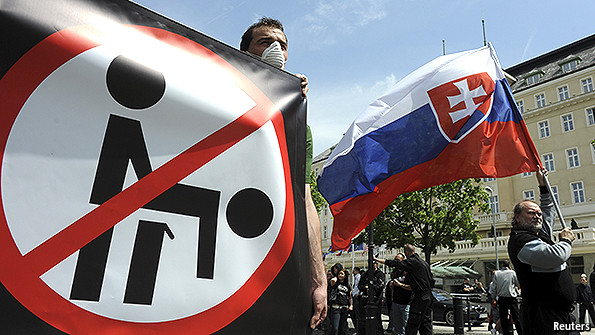This sounds pretty gay-hating to me.
Slovakia's anti-gay activists
Uncivil society

January 5, 2015
A genuine grassroots democratic movement to deny rights to same-sex families
BILLIONS of euros, dollars, pounds, kroner and other Western currencies have been spent over the past two decades trying to develop civil society in post-communist Central and Eastern Europe, much of it without success. But a forthcoming referendum in Slovakia shows that in some places citizens are capable of organising in pursuit of political goals—albeit ones not typically found on the liberal agendas of international non-governmental organisations. In just five months, the grassroots Alliance for Family (AZR) has collected more than 400,000 signatures (about 8% of the population) on a petition to restrict the family rights of gays.
The petition calls for a referendum aimed at tightening the legal definition of the family and banning same-sex couples from adopting children. President Andrej Kiska has scheduled the referendum for February 7th. Last year, the nominally leftist governing Smer party pushed through a constitutional ban on gay marriage, but the AZR says it does not go far enough to guarantee the sanctity of families and protect children. “For us the rights of children are more important than the rights of adults,” says Anton Chromík, a lawyer and one of the AZR’s leaders.
Social conservatism is typical in much of the region. Poland still bans almost all abortions, and 65% of Croatians voted to outlaw gay marriage in 2013. But organic political movements such as AZR are more unusual. The referendum the group has pushed through will pose three separate questions: Do you agree that only a bond between one man and one woman can be called marriage? Do you agree that same-sex couples or groups should not be allowed to adopt and raise children? Do you agree that schools cannot require children to participate in education pertaining to sexual behaviour or euthanasia if their parents don’t agree?
“We are not opposed to sexual education, we are opposed to sexual training,” says Mr Chromík, a father of five. “In Slovakia, without sexual training in schools, we have many fewer teenage pregnancies than in Britain.”
Mr Chromik's claim is accurate, but Britain is an outlier: it has one of the highest teen fertility rates in the developed world, whereas other countries with compulsory sex-education programmes, including France, Germany, Japan and the Nordic countries, have among the lowest. Slovakia's own teen birth rate (some 18 births per thousand girls aged 15-19) puts it well on the high side, all the more remarkable considering that its overall fertility rate is far lower than Britain's.
As for the issue of adoption, a 2012 study by the University of Nottingham found that Slovakia had the most abandoned children of the 22 European Union countries examined—4.9 per 1,000 births. Nearly 40% of Slovak orphans are housed in state institutions rather than with foster families—in the United States, the figure is about 14%—meaning there are plenty of children who could benefit from a bigger pool of willing adoptive parents.
Mr Chromík admits that the country’s adoption system needs reform, but says same-sex couples are not part of the solution. Among the over 100 organisations that now back the AZR cause, none is more important than the Catholic Church, of which 63% of Slovaks consider themselves members. Some sermons may allude to the referendum in the coming weeks. “In an atmosphere of love and family over the holidays we turn to the faithful and all people of good will, that in February they will actively exercise their right to vote affirmatively to the questions raised,” the Slovak Conference of Bishops said in a statement on December 18th.
With the church’s ability to mobilise voters, there is little doubt that over 50% of those taking part will vote in favour of the ballot initiatives. But for the plebiscite to have legislative force, half of registered voters must take part. The only referendum to cross this threshold in the history of Slovakia was a 2003 vote that paved the way for joining the European Union a year later; three others failed to do so. Croatia’s 2013 vote to ban gay marriage drew just 38% of registered voters.
Slovakia's lesbian, gay, bisexual and transgender (LGBT) groups are smaller, less organised and disproportionately centred on the capital of Bratislava. Rather than campaigning against the initiatives, they are encouraging people not to vote at all, for fear that "no" voters might push turnout over 50%. They also vow to challenge any initiative that succeeds in the European courts. In the end, a referendum defeated by low turnout might prove the ultimate sign that the country is a mature 21st-century democracy. Not only would it show that Slovakia has civil-society groups capable of getting their issues onto the national agenda—it would also show that, just as in most advanced countries, the dominant force in contemporary politics is voter apathy.
Slovak Politics and Gay Rights
http://www.nytimes.com/2014/12/31/opinion/slovak-politics-and-gay-rights.html?_r=0
"Post-Communist countries can be likened to Western societies operating with a time lag — repeating the same debates that their Western counterparts had some 10 years ago. One such example is Slovakia’s current controversy over gay marriage and adoption by same-sex couples."
Slovakia bans gay marriage in constitution
http://www.skynews.com.au/news/world/europe/2014/06/05/slovakia-bans-gay-marriage-in-constitution.html